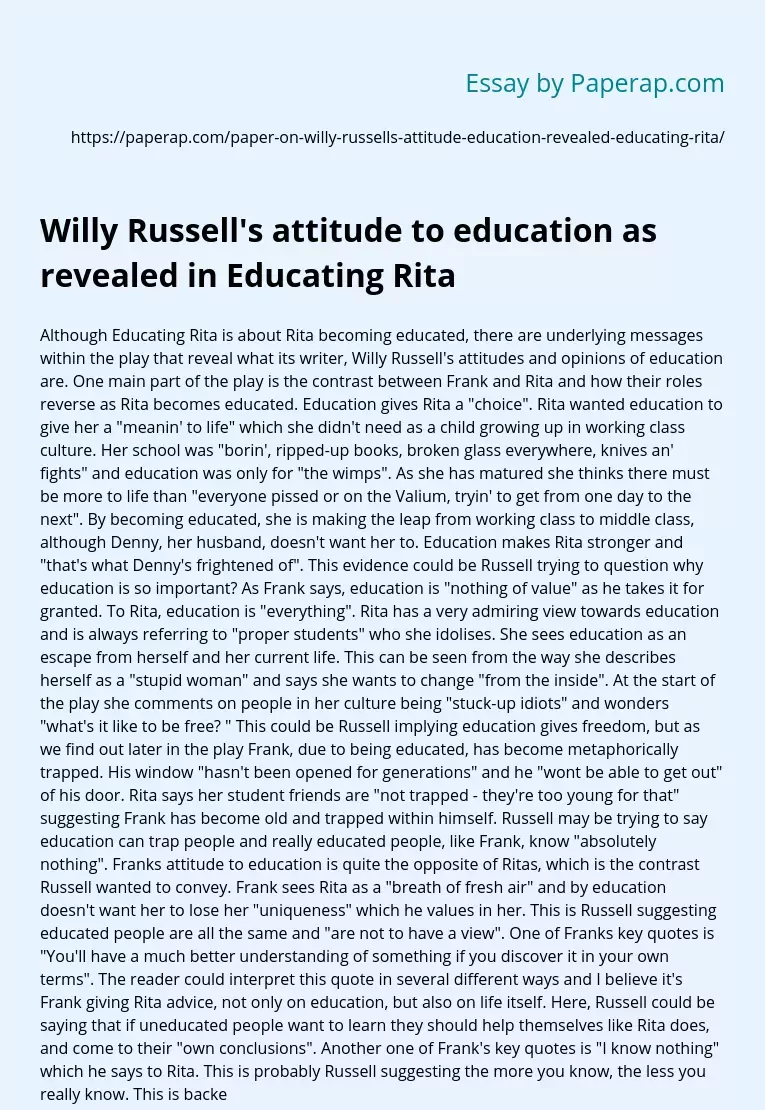Willy Russell's Attitude to Education as Revealed in Educating Rita
Although Educating Rita is about Rita becoming educated, there are underlying messages within the play that reveal what its writer, Willy Russell’s attitudes and opinions of education are. One main part of the play is the contrast between Frank and Rita and how their roles reverse as Rita becomes educated. Education gives Rita a “choice”. Rita wanted education to give her a “meanin’ to life” which she didn’t need as a child growing up in working class culture. Her school was “borin’, ripped-up books, broken glass everywhere, knives an’ fights” and education was only for “the wimps”.
As she has matured she thinks there must be more to life than “everyone pissed or on the Valium, tryin’ to get from one day to the next”. By becoming educated, she is making the leap from working class to middle class, although Denny, her husband, doesn’t want her to. Education makes Rita stronger and “that’s what Denny’s frightened of”.
This evidence could be Russell trying to question why education is so important? As Frank says, education is “nothing of value” as he takes it for granted. To Rita, education is “everything”. Rita has a very admiring view towards education and is always referring to “proper students” who she idolises.
She sees education as an escape from herself and her current life. This can be seen from the way she describes herself as a “stupid woman” and says she wants to change “from the inside”. At the start of the play she comments on people in her culture being “stuck-up idiots” and wonders “what’s it like to be free? ” This could be Russell implying education gives freedom, but as we find out later in the play Frank, due to being educated, has become metaphorically trapped.
His window “hasn’t been opened for generations” and he “wont be able to get out” of his door.
Rita says her student friends are “not trapped – they’re too young for that” suggesting Frank has become old and trapped within himself. Russell may be trying to say education can trap people and really educated people, like Frank, know “absolutely nothing”. Franks attitude to education is quite the opposite of Ritas, which is the contrast Russell wanted to convey. Frank sees Rita as a “breath of fresh air” and by education doesn’t want her to lose her “uniqueness” which he values in her. This is Russell suggesting educated people are all the same and “are not to have a view”.
One of Franks key quotes is “You’ll have a much better understanding of something if you discover it in your own terms”. The reader could interpret this quote in several different ways and I believe it’s Frank giving Rita advice, not only on education, but also on life itself. Here, Russell could be saying that if uneducated people want to learn they should help themselves like Rita does, and come to their “own conclusions”. Another one of Frank’s key quotes is “I know nothing” which he says to Rita. This is probably Russell suggesting the more you know, the less you really know.
This is backed up by some of the most intelligent people turning insane as they realise how insignificant their intelligence is. This is a very deep comment from Russell. Frank is not a stereotypical lecturer; he is “pissed” at lectures, always “on the stuff”, unhappy and only lectures as he “needs the money”. He is not enthusiastic and sees education as “so very little”. Here, Russell exposes an issue of education today. This is something he wants to be addressed. A point that Russell makes very obvious is the fact that most if not all uneducated people are in the working class, in situations they don’t like.
Denny gets himself out of the fact he can’t have a baby with Rita by moving on and having a baby with his new fianci??. Rita chose education instead of staying with Denny and is building a better life for herself. She “had a choice” and took it, and this shows that Russell thinks education can be good when you use it to your advantage and make it work for you. This is something Frank has not done. Frank has taken his education for granted and has wasted opportunities and this could well be another view from Russell to people in the educating process to take opportunities and not waste them.
This shows Willy Russell’s attitudes to education are mixed and are not all bad. Educating Rita’s comedy is mostly shown in the difference in background and language of Rita and Frank. Frank asks her “You are? ” and Rita replies, “What am I? ” This shows her naivety and may be Russell saying uneducated people aren’t accustomed to formal situations and language. This is also shown when Rita leaves a note saying, “sorry couldn’t come” when she was invited to Franks dinner. It shows the difference between their cultures and classes in which education plays a large part.
We see Rita change considerably throughout the play as she becomes educated. Her language changes, along with her image, personality and attitude. She respects herself, has choices and so feels she has become a better person. Frank also changes, he ends up having to move to Australia and realises his problems and mistakes. He is also changing for the better. It is argued whether the play should be called ‘Educating Frank’ as Rita teaches Frank what she knows and Frank teaches Rita.
Willy Russell's Attitude to Education as Revealed in Educating Rita. (2017, Sep 24). Retrieved from https://paperap.com/paper-on-willy-russells-attitude-education-revealed-educating-rita/

